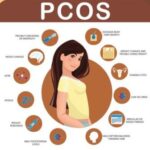Polycystic ovary syndrome (PCOS) is a prevalent and often misunderstood health condition that affects many women around the world. In this comprehensive guide, we will explain PCOS in detail, giving you a clear understanding of its causes, symptoms, diagnosis, treatment options, and how to manage it effectively. Let’s embark on this journey of knowledge and empowerment.

What is PCOS?
Polycystic ovary syndrome, often abbreviated as PCOS, is a hormonal disorder that affects individuals with ovaries. It is characterized by the presence of small, fluid-filled sacs (cysts) on the ovaries, which can lead to a variety of symptoms and complications.
Understanding the reasons
The exact cause of Polycystic Ovary Syndrome is still a subject of ongoing research, but several factors contribute to its development, including genetics, insulin resistance, and hormonal imbalance.
Recognizing symptoms
Polycystic Ovary Syndrome can manifest in different ways, and its symptoms can vary from person to person. Some common signs and symptoms include:
irregular menstrual cycle
excessive hair growth
acne and oily skin
weight gain
hair thinning
mood changes
Diagnosis and Medical Evaluation
To diagnose Polycystic Ovary Syndrome, health care professionals may perform a combination of physical examination, review of the medical history, and tests such as blood tests and ultrasound.
The Link Between PCOS and Fertility
Many women suffering from Polycystic Ovary Syndrome are worried about their fertility. It is important for people planning to start a family to understand how Polycystic Ovary Syndrome affects fertility.

Pcos Treatment options
The management of Polycystic Ovary Syndrome involves a multidisciplinary approach. Treatment options may.
lifestyle modification
medicines
hormone therapy
lifestyle modification
One of the primary ways to manage Polycystic Ovary Syndrome is through lifestyle changes. A healthy diet, regular exercise, and stress management techniques can significantly improve symptoms and overall health.
Medicines
Some medications can help regulate the menstrual cycle, control hair growth, and address other symptoms associated with Polycystic Ovary Syndrome.
Hhormone therapy
Hormone therapy, such as birth control pills, may be prescribed to regulate menstrual cycles and hormone levels in women with Polycystic Ovary Syndrome.
Long term health risks
Polycystic Ovary Syndrome isn’t just about fertility and cosmetic concerns. This may have long-term health effects,
Including an increased risk of:
diabetes type 2
heart disease
endometrial cancer
Conclusion
In conclusion, understanding Polycystic Ovary Syndrome symptoms is vital for early detection and effective management of this common condition. If you suspect you have Polycystic Ovary Syndrome or are experiencing any of the symptoms mentioned, consult a healthcare professional for a proper diagnosis and personalized treatment plan.
Frequently Asked Questions
- Can PCOS symptoms worsen over time?
- Yes, Polycystic Ovary Syndrome symptoms can worsen if left untreated. Early intervention is crucial.
- Is PCOS only a women’s health issue?
- Polycystic Ovary Syndrome primarily affects individuals with ovaries but can also impact their overall health.
- Can Polycystic Ovary Syndrome symptoms be managed without medication?
- Lifestyle changes, such as diet and exercise, can help manage PCOS symptoms, but medication may be necessary in some cases.
- Are all women with irregular periods diagnosed with Polycystic Ovary Syndrome?
- No, irregular periods can have various causes, and Polycystic Ovary Syndrome is just one potential explanation.
- Is infertility a guaranteed outcome of Polycystic Ovary Syndrome?
- While Polycystic Ovary Syndrome can affect fertility, many individuals with Polycystic Ovary Syndrome can conceive with proper treatment and care.










